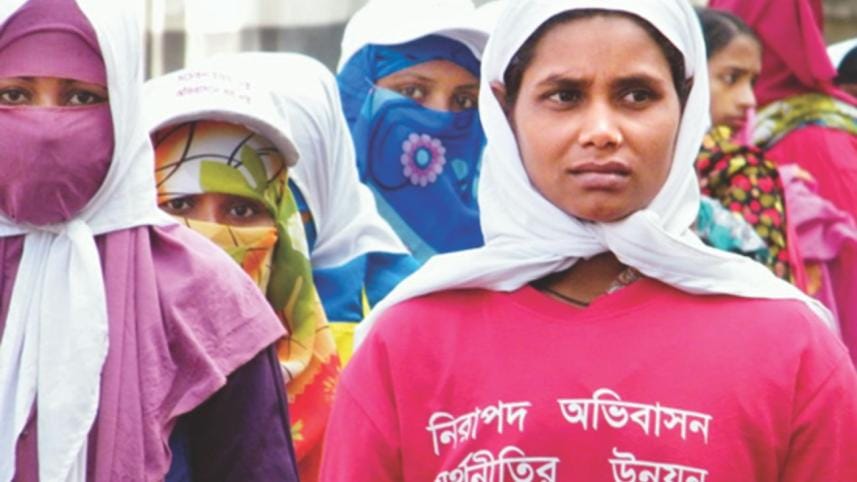REMITTANCES THAT COME WITH A PRICE

Despite women's crucial role as remitters, there is widespread antipathy towards female migration. It also epitomises the poor response towards government's call for registration to migrate to Saudi Arabia which has recently signed a MoU with Bangladesh to take 50,000 women, mostly as housemaids. To the surprise of many, over the last four months only 161 women have migrated under the scheme.
Though the formal employment of rural women was first evident in the 1980s with the rising demand of cheap labour in export-oriented garment factories, it was not until the 1990s that women from low-earning rural families in Bangladesh started migrating independently to the Gulf and Southeast Asian countries to work as nurses, garments workers, manufacturing labourers, cleaners and housemaids. The late arrival of Bangladeshi women into the global labour market is primarily due to the restrictive policies of the state. While in the early 1970s there were no clear cut policies on female migration, over the 1980s and 1990s the state imposed a complete or partial ban on women's labour migration for unskilled, semiskilled and skilled jobs on the grounds of 'protecting the dignity of women'. The decision to impose restriction on the female migration of labour in all categories in 1997 was heavily opposed by the association of recruiting agencies (BAIRA), migrant associations and human rights organisations.
Consequently, it was lifted in 2003, but new conditions were imposed, that women undertake compulsory skill and orientation training for domestic work. The labour migration procedures for Bangladeshi women still remain more complicated than those for men, who do not need to satisfy such requirements for migration.
The reasons of such low representation of women may be traced back to the public discourses on gender roles and relations, which presuppose man as the principal provider and woman as the carer of the household. From this perspective, women's earning is always secondary to that of their men. In rural Bangladesh, women embody prestige of their patriarchs. The gender ideologies of honour, prestige and seclusion thus inscribe women's geographical mobility within the boundary of 'home' and perceive Bidesh as 'dangerous', 'unsafe' and thus 'disgraceful' for women. On top of that, in the highly segregated international labour market, poorly paid and low-status jobs as housemaids, cleaners are almost reserved for Bangladeshi women who are also vulnerable to abuse and torture at the hands of the employers.
An ongoing RPC-RMMRU study, however, has come up with some intriguing findings about remittance behaviour of Bangladeshi men and women. The research shows that although absorbed in low-paid unskilled work, women are altruistically better remitters than men and send almost all their earnings back home for their family, while men can save a portion for themselves. The onus on migrant women to remit money is no less than their men due to the high social cost attached to women's migration. Women are expected to send the whole earning in exchange for their long absence from the family. Crucially, the remittances sent by women are used to meet household expenditure, pay off loans, marriage and education of children and siblings - which are commonly observed in male migration. Like men, women invest their remittances in land, house, small business and further migration of family members. While the economic value of remittances sent by men and women is beyond question, unlike men, female remitters accumulate little social status for their contribution to the household economy.
Encouraging women's increasing participation in labour migration thus requires changes in the social mindset in the first place, that sees migration as extremely 'risky', 'unsafe' and 'unwieldy' for women. To this end, nothing is more important than ensuring safety, welfare and justice for women in the workplace. Government's persistent migration diplomacy with the receiving countries as well as development of regular monitoring and huge support system are bound to bring positive results. Also, our dependence on the Gulf countries as markets for female workers should be reduced by a large scale through skill training of women to help them get dignified jobs in the countries with good human rights records. In truth, the extent to which remittances can be used as a development tool depends on how effectively we can elevate the status of the 'disgraced' onto the ranks of the most valued and respected women of Bangladesh.
The writer is Associate Professor, Department of International Relations, University of Dhaka.
 For all latest news, follow The Daily Star's Google News channel.
For all latest news, follow The Daily Star's Google News channel.
Comments